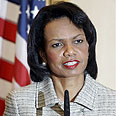
'End Arab anti-Semitism'
Dozens of American senators sign letter calling for US pressure on 'friendly Arab states'. Former State Department officials warn Condoleezza Rice that failed peace conference in autumn 'could further set back situation in Middle East'
Arab states with close relations to the United States should end anti-Semitic and anti-Israeli incitement, and increase their commitment to a Middle East peace process, if an upcoming key autumn peace conference is to succeed, a letter signed Tuesday by dozens of American senators said.
Some 77 senators added their names to the letter, addressed to US Secretary of State Condoleezza Rice, and authored by New York Democrat Charles Schumer and South Carolina Republican Lindsey Graham.
"As you step up American diplomatic actions and prepare for a future international meeting on the Arab-Israeli conflict, we believe it is essential that other key players in the Middle East also step up and meet their responsibilities. The success of such a meeting, and ultimately the peace process itself, will depend on the cooperation we receive from the larger Arab world, particularly from those Arab states with close relations with the United States who have not yet signed agreements with Israel," the letter said, hinting at states such as Saudi Arabia.
"Your ongoing efforts to work with Israeli Prime Minister Ehud Olmert and Palestinian Authority President Mahmoud Abbas are critical, but so is the support these efforts receive from those Arab countries," the senators stressed in their message to Rice.
Arab states must "participate in the upcoming international meeting and be a full partner of the United States in advancing regional peace, take visible, meaningful steps in the financial, diplomatic and political arenas to help Palestinian President Abbas and Prime Minister Fayyad govern effectively and meet their obligations to fight terror," and "stop support for terrorist groups and cease all anti-Israel and anti-Jewish incitement," the letter declared.
Other measures included a call to "recognize Israel's right to exist and not use such recognition as a bargaining chip for future Israeli concessions, end the Arab League economic boycott of Israel in all of its forms, pressure Hamas to recognize Israel, reject terror and accept prior agreements and isolate Hamas until it takes such steps."
The senators warned that "without a sincere commitment from our allies in the Middle East to be partners in this effort, peace in the region will remain elusive".
'Price of failure high'
Secretary of State Rice also received a second, separate message from five former State Department officials and a Middle East analyst, which warned of the high consequences of a failed autumn peace conference.
"Expectations in the region have been raised, and many are hoping for a significant political breakthrough. At the same time, the criteria for success are vague and the perceptions of the various players and potential players differ widely. The meeting as it stands now seems to be something of a gamble. If it fails, resulting in disappointment and disillusionment, it could further set back the situation in the Middle East," the former ambassadors said in their own letter.
In an effort to bolster the conference's chances of success, the former officials, together with Professor Steven L. Spiegel, professor of political science at UCLA, composed 'A Guide to a Successful November International Conference,' under the auspices of the Israel Policy Forum think tank.
Their policy paper calls for the autumn conference be broken up into a series of meetings, in order to decrease expectations and tensions. Other recommendations include a stepping up of American involvement the drawing up of a statement of understanding between Israel and the Palestinian Authority.
"The Bush Administration cannot remain on the sidelines for long. It must have contingency plans to work for a successful statement," the paper said.
Marty Iron, a spokesman for the Israeli Policy Forum, told Ynetnews that the paper's authors were motivated by a deep concern over the prospects of failed peace efforts for the region, but added the proposals were "also a series of detailed policy recommendations".
"If the conference fails, any hopes for any agreement would be postponed until the Bush administration leaves office," Iron said.










